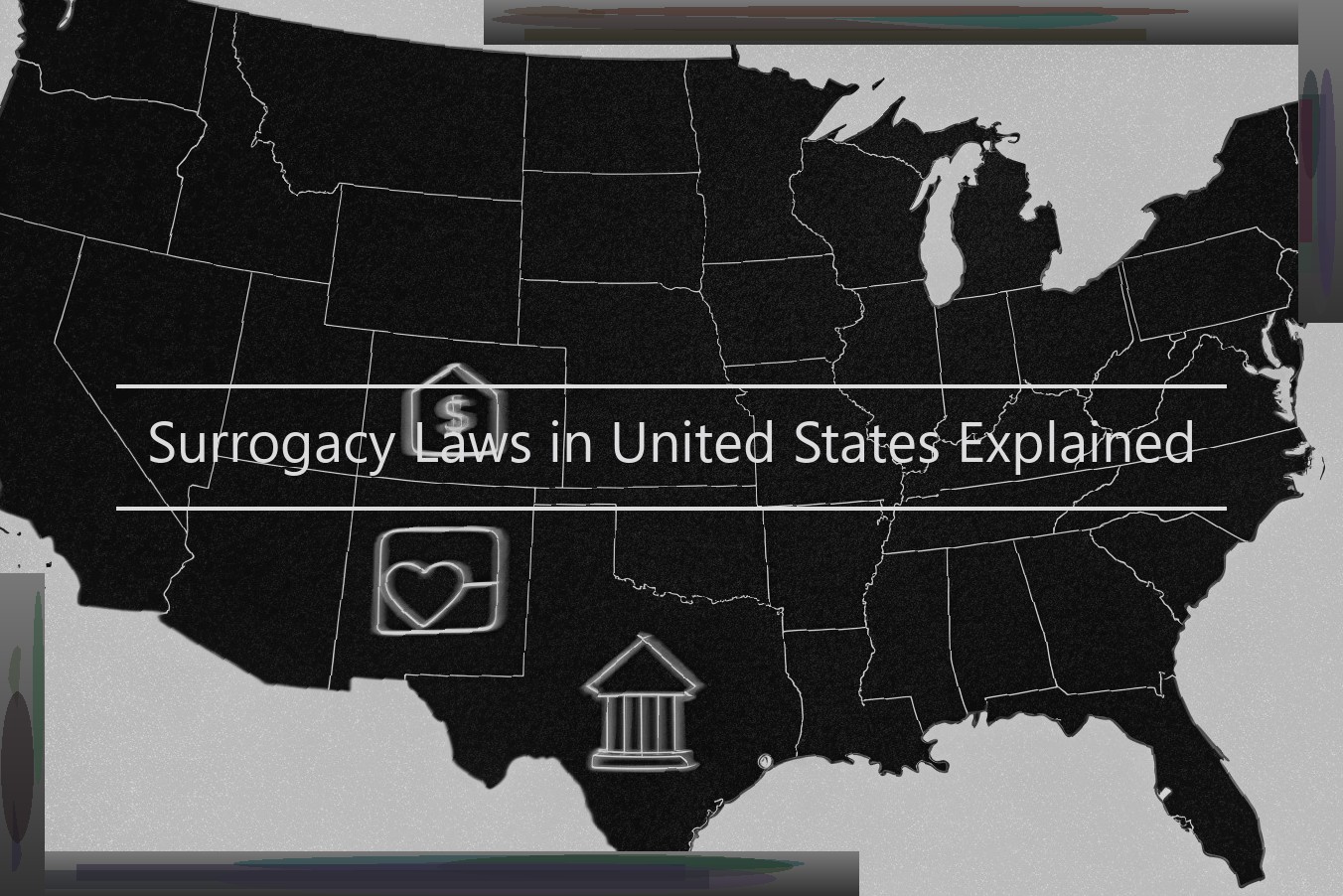Surrogacy Laws in United States Explained
The Basics of Surrogacy Laws
The surrogacy process is often a complex and emotionally charged journey for all parties involved. With this complexity come many legal uncertainties, making it crucial for both intended parents and surrogates to have a comprehensive understanding of their rights and proponents of the law. In the United States, surrogacy laws are not uniform and can vary dramatically from state to state. This patchwork of regulations can make the process difficult to navigate and potentially perilous for those who do not have a solid grasp of the legal landscape . The need for clarity is essential for all involved, as it helps in minimizing the risk of legal challenges that could not only jeopardize the surrogacy arrangement but could also affect the welfare of the child being brought into the world.
The purpose of this piece is to provide an overview of the legal aspects of surrogacy. As we explore the laws around surrogacy in the U.S., we will focus on the obligations and rights of individuals in a surrogacy arrangement, the various types of surrogacy agencies, and how contracting between the surrogate and the intended parents can provide necessary legal protections.

Which States Currently Allow Surrogacy?
There are several states that fully provide for the legalities of surrogacy and even grant the written request for a surrogate to be established as the legal parent of a child born through commercial surrogacy, including: Michigan, Tennessee, Utah, Washington, Delaware, New Jersey, Massachusetts, Connecticut, Florida, Nevada, Idaho, Illinois, South Carolina and Georgia. Per the laws established in these states and territories, surrogate parentage agreements are specifically allowed, and the parentage order at the completion of a surrogacy process is typically automatic, as long as the surrogate is not biologically related to the child.
Other states that have case law that provides for the enforceability of a surrogate parenting agreement include, Missouri, New York, Ohio, Oklahoma, Pennsylvania, Texas, and Virginia. These surrogate parenting laws establish that when there is a surrogate parenting agreement in place, the intended parents will be adjudicated the parents of the child if they meet the requirements of the surrogate parenting agreement. In other words, even if the surrogate is not biologically related to the child, the surrogate may not necessarily be established as the legal parent if she did not waive her rights to parentage, or the obligation to pay child support, in advance.
Other states and territories have laws, statutes and case law that may prevent the enforceability of surrogate parenting agreements. These states may include North Dakota, Louisiana and Arizona. In North Dakota, a surrogate parenting agreement is specifically prohibited, however, the case law appellate decision in Gage v. Robinson holds that unscrupulous restrictions on personal rights are unconstitutional. The Gage case established that the agreement between two parties can be enforced even if no compensation is exchanged. In Louisiana, surrogate parenting agreements are not allowed as both commercial and altruistic surrogate parenting agreements are specifically barred in the state. However, these agreements are enforceable in neighboring Texas. And in Arizona, although they have limited enforcement of surrogate parenting agreements – it is recommended that intended parents do not enter into surrogate parenting agreements in the state.
States That Have Restrictions on Surrogacy
The following states have restrictions on surrogacy, or regulate in some manner, the process of creating a child through the use of a surrogate mother. Restrictions vary from state to state: California: California prohibits the use of gestational carriers where the carrier is intended to be the mother of the child. California permits the use of surrogate mothers and gestational carriers as long as the sending parents are not intended to have a genetic relationship to the conceived child. California also asks for a parental order after parentage is established through an adoption procedure whereby it is usually established that the gestational carrier is either not genetically related to the child or was not the person who gave birth to the child. Florida: Surrogacy is expressly permitted under Florida law and is used often by Fla. residents and by people from outside of the state. Michigan: Michigan’s surrogate statutes allow for married intended parents only and prohibits the use of gestational carriers or traditional surrogacy. In Michigan, surrogacy is premised on the adoption of a child from the surrogate mother by the intended parents on terms whereby the surrogate’s rights as a parent are severed.
States That Prohibit Surrogacy
Surrogacy is illegal in the following states and could result in criminal penalties: Louisiana, New York, and Utah. Their laws vary in definition and punishment of the crime (both in the surrogate and in anyone who happens to assist a surrogate):
Louisiana:
Definition: Strictly prohibits gestational surrogacy arrangements. Any agreement is null and void.
Penalties for surrogates: The surrogate would be guilty of a felony and subjected to a fine of up to $10,000 and/or imprisonment of between 6 months and 2 years.
Penalties for would-be intended parents: Any person who "renders services to effect" a surrogate agreement may also be guilty of a felony punishable by up to $10,000 and/or up to 2 years in prison.
New York:
Definition: Gestational surrogacy is banned; pursuant to the law, such a contract would be deemed void as contrary to public policy. The law also offers protections to a surrogate under certain circumstances.
Penalties for surrogates: Surrogacy is a misdemeanor, punishable by a maximum fine of $500.
Penalties for would-be intended parents: A person can be fined up to $10,000 and/or face imprisonment of up to 6 months for taking part in an illegal surrogacy transaction in the state of New York.
Utah Domestic Surrogacy Act of 2015:
Definition: Surrogacy prohibited, unless compliant with the act. It does not recognize surrogacy contracts with a genetic link between at least one of the genetic parents and the child. Under § 78B-6-1304, any contractual agreement to act as a surrogate mother in Utah will run contrary to state policy.
Penalties for surrogates: The surrogate can be fined up to $10,000 and/or face imprisonment of up to 5 years. Taking part in a surrogacy contract results in the termination of the parent-child relationship between the surrogate and child.
Penalties for would-be intended parents: The surrogate, the surrogate’s husband, or an heterosexual married couple that render or receive surrogacy services that indirect or direct, in Utah, are guilty of a class B misdemeanor.
The states above prohibit surrogacy arrangements, no matter what type. Unless you are already in the process of forming a family outside your home state, it is important to stay away from surrogacy arrangements in these states.
What Does the Law Say About Intended Parents?
All surrogacy arrangements should be formalized in a legal agreement between the surrogate and the intended parents. At the outset, such an agreement should address the rights and responsibilities of the intended parents and that of the surrogate. This is especially important because the objective may be to provide the intended parents with a right to parentage even in the event that they become unable to pursue the arrangement once the child is born. Such an agreement may also address matters relating to what happens if medical complications require the birth mother to undergo abortion or the termination of life support of, or if the child has genetic abnormalities. Generally speaking, an agreement should include information regarding financial matters, parenting and custody rights, the surrogacy process, health, and other related matters. Such an agreement should be thoroughly reviewed by both intended parents and a trusted family law attorney so each party knows the complete implications of the surrogacy process.
Contracts When It Comes to Surrogacy
While many states in the U.S. have laws regarding surrogacy, they vary widely. Legal parentage of the child can be complicated by the existence of local surrogacy laws. You and your surrogate must understand the legal requirements that apply to your situation before proceeding. Public adoption agencies can often provide information about the domestic laws in a given state. Surrogacy contracts can provide both emotional support and legal protection for you and your surrogate. They usually address several key areas and may even include compensation for your surrogate’s services (which in many states can be deducted from your income taxes as a medical expense): • Health insurance and medical care • Legal issues , including the rights of the sperm donor if the surrogate is the child’s biological mother • What happens in the event of multiple births • Restrictions on the surrogate’s activity, such as smoking or use of medications • The surrogate’s right to make medical decisions, including whether or not to continue the pregnancy if the fetus is abnormal, or to terminate the pregnancy if the child has a genetic disorder for which you are not the biological parent.
Legally Going Through Surrogacy
To navigate the legal terrain of surrogacy agreements, intended parents and surrogates must be aware of and comply with the laws of the states in which they reside and the state they intend to deliver the child in that govern the surrogacy arrangement. In some instances, intended parents will contract for a surrogacy agreement in one state but plan to deliver the child in another state. It is important to understand the laws of both states to ensure compliance. For example, both Michigan and Texas have addressed surrogacy in their statutes and both completely ban surrogacy agreements. However, a Texas court has held that an out-of-state surrogacy agreement that does not comply with Texas law may be enforceable as a contract between the parties. Thus if a Texas resident intends to deliver their child in Michigan, any surrogacy agreement should not be entered into in Texas, but rather in Michigan, and the (intended) parents should plan on delivering in a state that recognizes surrogacy agreements for the surrogacy agreement to be enforceable.
It is in this landscape that surrogacy agencies, donor and recipient egg banks and egg donor agencies must enter into contractual agreements with individuals to give a recitation of applicable state laws to ensure that individuals and companies involved in surrogacy arrangements comply with the laws governing the surrogacy agreement.
Working with a Surrogacy Agency
Surrogacy agencies are businesses that connect parents who wish to have children with surrogates. It is also possible to have a surrogacy that has no agency involved. While legal situations are usually easier with an agency, it is not a necessity. Surrogacy and egg donor agencies contract with women who wish to act as surrogates. The agency matches them with couples who want children but cannot have children through traditional means. The surrogacy relationship is often arranged through the agency, which handles the contracts necessary for the arrangement as well as helping the couple and surrogate throughout the pregnancy. Some sperm banks and egg donor agencies also offer surrogacy services. They work with willing donors who agree to help an intended parent or parents to have a child through artificial insemination or IVF (in-vitro fertilization). There usually need to be contracts for the donors and the intended parents in these situations, since many sperm banks and egg donor clinics have several contracts for their staff to oversee surrogacy arrangements. Agencies generally help intended parents and surrogates through the legal system of the state where they reside. This typically includes help with adoption procedures or getting orders for pre-birth orders. Contracts will usually include clauses that transfer parental rights to the intended parents through surrogacy. Having the contracts approved by a court provides additional security for surrogacy arrangements, particularly in the case of multiple surrogates or potential disputes between intended parents.
Surrogacy on an International Level
International surrogacy is a consideration for many intended parents in the U.S. who may have difficulty creating an embryo using their own egg or sperm, or who need to travel abroad to find a surrogate willing to use an egg or sperm from a donor they select.
As a general rule, the United States has recognized the enforceability of surrogacy agreements based on the law where the agreement was entered into. Internationally, however, the enforceability of surrogacy agreements is a far more complicated process.
Most of Europe does not yet recognize surrogacy as a valid and enforceable contract, although that’s not the case in Spain or the Ukraine. The European Court of Human Rights (ECHR) ruled that France’s refusal to permit the French birth mother to have her Ukrainian surrogate adopt her child violated her right to family life under European law.
However, the ECHR’s opinion does not legally bind the European Union. So right now, there is no coherent law regarding surrogacy among the countries of the E.U. In fact, surrogacy is only legal in a handful of European nations that include the U.K., the Netherlands , Cyprus, Belgium, Greece, Spain and the Ukraine.
Some countries that have previously permitted surrogacy have reversed their position. For example, the Federal Constitutional Court in Germany accepted the enforceability of commercial surrogacy in 1997. However, the law has since been modified to prohibit German citizens from engaging in surrogacy arrangements. Similar laws have been enacted in Sweden.
Similarly, France, which had previously permitted surrogacy, or rather not criminalized it, enacted amendments to its law in 1994 to prohibit surrogacy.
The use of surrogacy also varies in the Middle East. Iran, Israel, Turkey and Kuwait currently permit surrogacy, while Egypt, Jordan and Syria do not. As reported in the French publication Liberation earlier this year, Russia introduced a draft bill that would end commercial surrogacy, stating that it lead to the "degradation of women and led to grave social consequences."
Other countries that allow surrogacy include India, Sri Lanka, Kenya, Greece and Mexico. South Africa has draft legislation regarding surrogacy, but the revised law has not been passed.




